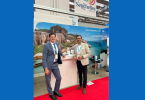Humanity in the world and in the meetings industry will be the central common theme to the key trends of 2018.
After years when technology has been revolutionizing the meetings industry and accelerating the rate of change in how we live and work, in 2018 there will be a return to a focus on people.
That is not to say that new technology innovations will not continue to transform the world around us. Guest management might one day be fully automated, big data and processes will have everything communicating with everything, and new concepts such as Virtual Companions and A (Automated) – Commerce, the successor to e-commerce, will soon be with us.
But at this time more people are asking questions, throughout this industry and in society, about whether people – and their lives, their feelings, their aspirations, their health and their minds – are being sufficiently prioritized as society copes with challenges and adapts to progress.
Here are five trends, each with people at the heart of the issue, that IMEX believes will be clearly evident and highly influential in 2018.
1. Security
In 2016 in particular, security became one of the greatest challenges of our time.
Subsequent events have brought the industry very much together, notably when united in support of #VegasStrong at IMEX America 2017 and they have reinforced the need for vigilance, resilience, unity and globally recognised and agreed standards.
Attendees and staff at meetings and events of all types need all the confidence and reassurance that organisers and venues can give them that everything possible has been done to keep them safe.
It is a topic that must remain top of mind and top of the agenda in 2018.
2. ‘Anti-tourism’, ‘over-tourism’ and the impact of the sharing economy
In recent months ‘anti-tourism’ and ‘over-tourism’ movements have come to the fore in many cities. There has been an outcry from people who feel that too much tourism is damaging their communities and their lives.
Rumblings of discontent have been exacerbated in many areas by the explosion in the use of services such as Airbnb and Uber. There is now a ‘kickback’ with resistance leading to a slowing down in the growth of these businesses. In the US, political issues such as the Bathroom Bill have led to the ‘weaponisation’ of travel. All these issues will continue through 2018; however, this presents a unique opportunity for the business events industry to define itself as distinct from leisure tourism. The industry must continue to strongly communicate the short and long-term benefits that meetings, events and incentive travel bring to a destination – both in terms of the high impact direct benefits, as well as longer term indirect benefits associated with the development of knowledge and innovation economies.
Professor Greg Clark, who is advising several major cities on how they should handle urbanisation, will be sharing his thoughts at IMEX in Frankfurt on the role of the meetings industry in helping cities adapt to this issue.
3. Women in the industry – rising in prominence
The rising importance of diversity, particularly around women in the workplace and career advancement, is important across all sectors, and the meetings and events industry is no exception.
After an overwhelming response to our joint research project with tw tagungswirtschaft magazine, there were enormously positive reactions to the Women in Leadership receptions that took place at our shows in 2017.
As a consequence, IMEX has now launched, with tw, the first ‘She Means Business’ conference taking place on EduMonday (the day prior to IMEX in Frankfurt 2018), giving women – and men – from across the world the space to explore the issues that matter. She Means Business has a series of inspiring speakers, all women who are trailblazers in their field, and is set to celebrate the role of women in the industry, as well as providing conversation, collaboration and learning.
4. The new age of anxiety
In June 2017 Alex Williams in the New York Times, after WH Auden’s original Age of Anxiety 70 years ago, described our current times as ‘the new age of anxiety’. On college campuses, anxiety is running well ahead of depression as the most common mental health concern. He said that the fidget spinner is ‘the perfect metaphor for children of today.’
A survey carried out by MPI for IMEX revealed that only 5% of the meetings professionals surveyed felt no stress at work.
Skift dedicated its recent annual big topic special edition to ‘Travel in the age of Permanxiety.’ It described this as ‘a near-constant state of anxiety exacerbated by hyper-connected citizens using social platforms to create a state of permanent frenzy about a lengthy list of issues from terrorism and Trumpism to technology and economic gaps’.
Most employers and event organizers are aware of this as a growing concern and are starting to put processes and facilities in place to help alleviate it. In October the UK government published the Thriving at Work report, which puts the annual cost to the UK economy of poor mental health at up to £99bn, of which about £42bn is borne by employers, before advising what needs to be done to address it. Arianna Huffington’s Thrive Global campaign is also putting the spotlight on this issue and providing solutions.
Meanwhile, at IMEX exhibitions everyone can take care of their wellbeing at the Be Well Lounge, where we run yoga and meditation sessions, as well as new white space areas which act as a place to unwind. The popularity of the many education sessions on health and wellbeing is a positive sign that the industry is concerned about taking care of its people.
5. Life 3.0 – when robots are replacing humans at work, what will humans do all day?
Economist Todd Buchholz, in his keynote at IMEX America 2017, cited worries about the effect of AI and robots on job security as one of the main causes of the ‘age of anxiety’. Louise Brownhill, chief learning officer at PwC, recently quantified the potential impact saying that “In five years, a third of human jobs in professional services firms will be replaced by AI.”
This issue is becoming monumental, described by some as the ‘Fourth Industrial Revolution’ and by Professor Max Tegmark of Massachusetts Institute of Technology as the start of ‘Life 3.0.’ – “how can we grow our prosperity through automation without leaving people lacking income and purpose?”
Robots will force us to be creative, says Sir Nicholas Serota, head of Arts Council England, highlighting the need to skill people to work in an adaptable way to changing environments.
Toby Walsh, Professor of Artificial Intelligence at the University of New South Wales, suggests that “we might just work a shorter week. That was the case in the Industrial Revolution. Before the Industrial Revolution, many worked 60 hours per week. After the Industrial Revolution, work reduced to around 40 hours per week. The same could happen with the unfolding AI Revolution.”
The effect this will have on meetings and events is a topic of rising interest with Event MB, for example, exploring the Rise of Artificial Intelligence and How Artificial Intelligence is Changing Events in a number of recent content pieces.
Although event technology is automating so many administrative tasks, the essence of this industry is that it is the creative human led approach that delivers results. At its heart this industry exists to bring people together face-to-face in effective ways to help them achieve business and transfer ideas, to learn from one another and to build relationships.
While event professionals need to be ever sensitive to how AI and robots impact on the sectors that they work with and cannot be complacent, the interaction of people and being sensitive to their needs and how they express them is an irreplaceable factor that is central to arranging and running meetings and events.
Summing up these trends, Carina Bauer, CEO of the IMEX Group, says: ”This is, as often said, ‘a people industry’ and while we promote and support technology, we must take note of these trends, and look after our people, their health, their safety, their sense of fulfillment and their futures.”
Many of these topics will be discussed during education sessions at IMEX in Frankfurt 2018 which takes place on 15-17 May. The IMEX team welcomes approaches from speakers and topic experts who can now submit session proposals online.
Sessions, which can be delivered in English or German, should tie in with one of the show’s 10 tracks, ‘Trends and Research’ being one of them. The others are: Business skills, Diversity, Health and wellbeing, Personal development, Technology, Creative learning, General education, Marketing/social media and Sustainability. The closing deadline is 17 January 2018.
Currently reading:
1,015






